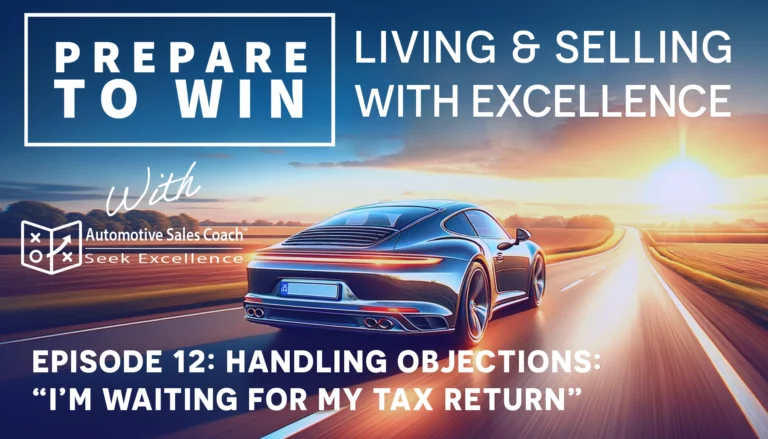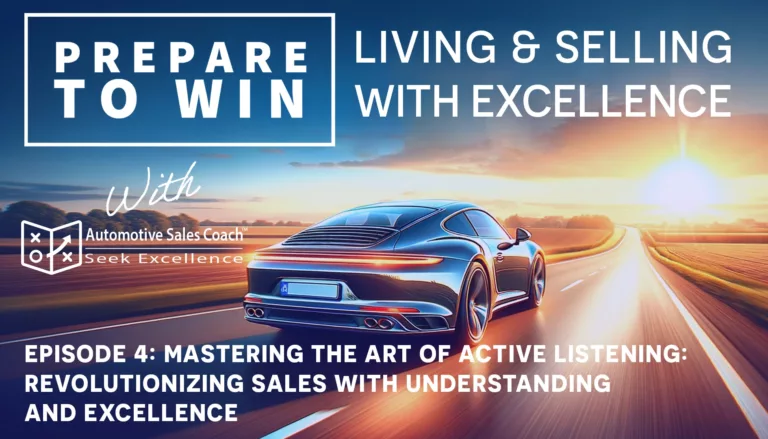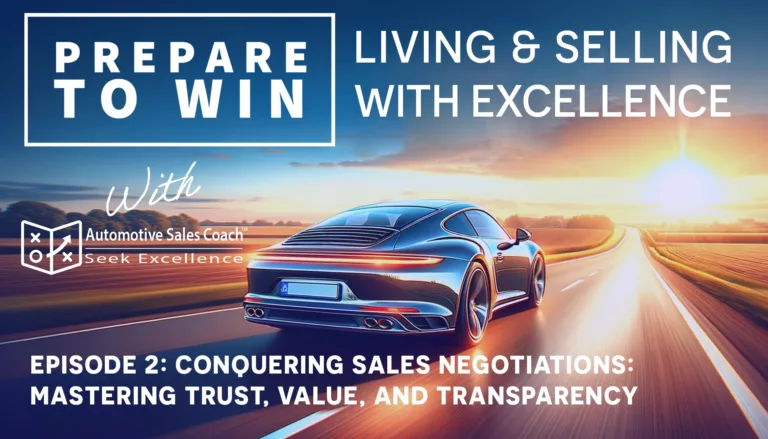Welcome to our latest episode of ‘Prepare To Win.’ In this episode, we dive deep into the power of empathy in sales and life. I’m thrilled to share insights on how understanding and connecting with people can transform your approach in both your professional and personal interactions.
We discuss the crucial difference between empathy and sympathy and how this understanding can significantly impact your relationships with customers. It’s all about connecting on a deeper level, beyond just agreeing with them.
One of the main focuses of this episode is the art of active listening. We explore how truly listening to what others are saying, rather than just waiting for your turn to speak, can open up new avenues of understanding and connection.
But it’s not just about understanding feelings. We also delve into how balancing empathy with logic can lead to more effective conversations and decision-making, especially in the sales environment.
Join us for this episode as we unpack these concepts with practical examples and easy-to-implement strategies. It’s not just a talk; it’s about giving you tools to improve your sales approach and build stronger, more meaningful connections with your customers. Tune in and let’s learn together how to make empathy a key part of your success story.
David Lowe: 0:00
Welcome to Prepare to Win. Today, we’re going to talk about the power of empathy, not just in your work life, but in your personal life as well. Stay tuned.
Grace Lupoi: 0:21
Hi guys, I’m Lupoi and and I’m here with David Lowe, the Automotive Sales Coach, and we’re talking about empathy today. Right, and really, have to to first define empathy and what empathy really means.
David Lowe: 0:30
Hello everyone, great to be with you again, and empathy is a big subject as a matter of fact. In our last episode we talked about this upcoming episode and actually, if you go back through our episodes, you’ll see we use it a lot. It’s the most powerful communication skill set that we can develop the power of empathy right, not just for our work life, but our personal life. Now listen, we’re going to define empathy right Showing somebody that you hear them and you understand them right. It doesn’t mean that you agree with them. Empathy says I hear you. Thank you for sharing that with me. I’ve listened to you right. You have influenced me and I understand where you’re coming from. It is not. You make a great point and now I believe what you believe. Let’s call that sympathy. Sympathy is agreement, empathy is understanding. Now, why is this so important? As a matter of fact, I get messages from salespeople I’ve trained years ago that have moved on to different industries. They said the greatest thing that I ever learned from you was the power of empathy. And as I and they’re moving to organizations and they rise to the top of the sales organization using the processes, the skills we teach them, and they’re saying that it’s unbelievable here, at this company, at this group, with all these salesmen. Nobody knew about the power of empathy till I taught them it, right? So these are students of ours that are out there mentoring others. Isn’t that the point, right? That we want to go ahead and be a benefit to each other and share what we know. And when we share what we know, one one’s most, one teaching others right, so it comes back to us All right so empathy is this power to say listen, you’re important to me, I value you and I value what you have to say. I’m going to go ahead and let you know, through empathy, that I’ve heard you and I understand you. In other words, I value you. Does that make sense? It does so. Here’s the problem. People have these debates all the time. It’s like playing ping pong. We’re trying to score on each other, right, we’re trying to get the ball by. And so somebody says something and somebody respond. We respond right away. So in the car business, it might be I want more from my trade. That might be in the car business, and the response might be hey, the market decides, all right. And so now there’s this ping pong going and nobody ever slows down enough to say I hear you and I get it right. Same way in life I believe this, you know, in a personal life and somebody says well, I believe this. And now there’s no mutual understanding or respect because nobody has sought out the other person’s viewpoint. Right, and listen. When I seek out somebody else’s viewpoint, I’m open to the fact that if I’m wrong, I want to know it. Right. Right, so I’m listening to you, not so okay, when you’re done speaking, then I’ll tell you what the truth is. Right, I’m listening to you so you can know I value and I respect you. I want to understand your point of view and guess what? Sometimes in our personal lives, when we have an open-enough mind, we might have certain feelings and beliefs that we hold strong, and then somebody comes along with some new information, and what happens to our thinking?
Grace Lupoi: 3:59
It might change.
David Lowe: 4:01
It blows up right.
Grace Lupoi: 4:02
That’s a great point and I think it goes right along with one of our past episodes talking about active listening right. The art of I listen to hear you. I don’t listen to respond, and so when we start at the very beginning of okay, how do I listen to people that I’m talking to? Do I listen with ears that I’m open to hear you, or I just? Okay, I finished talking and I’m going to tell you why you’re wrong. Right, For me to show empathy, I have to first do that first step of what is my, what is this person saying to me? Then I have the opportunity to slow down and use that empathy, Isn’t that?
David Lowe: 4:30
great and empathy is an automatic kind of a slow down. Absorb what’s happening, right. Speed kills, it kills in sales and it kills in our personal life and communication. Most of the mistakes I’ve made in my life probably in the name of going too fast, especially interpersonally. So I think we can all say, boy, if I could use empathy more effectively, I could be a better communicator, my professional life would have improved and so would my personal life, right? So obviously we are in the business of selling cars, and so we’re teaching empathy all the time. We’re in the business of selling service. We’re teaching empathy to right Customer service and the deal. We’re teaching empathy letting people influence you. So the point is this it’s not new, it’s one of those natural laws that Stephen Covey natural laws. Right, these are the things that govern mankind. It is what it is, it’s always been. You can’t make a natural law. They will always exist. It’s our response to the natural law, how we understand it and utilize it. Solomon said the same thing 3,000 years ago. Right, wisdom was laid at the foundation of the universe. In other words, things are the way they are and if we can understand things, the principles that drive nature and human nature, we can use those to be a benefit to ourselves and to others. Okay, so we understand. So I’m going to take you back to the oldest empathy statement that I’ve heard in my life, and I don’t know where it started, but it’s called feel belt and found. I mean, I don’t know where I heard it, but it’s been around for probably a zillion years, I don’t know. But it says listen, grace, I know exactly how you feel. I felt the same way. The feel felt turnaround was a way to teach salespeople how to properly stop and let acknowledge what the person was saying. The problem is it often goes too quickly to be effective, right? So, coming up in some a future episode, we’re going to talk about the difference between craft and art, because selling is both craft and it’s what Art? It’s art. You’re going to want to catch that episode as well. We’re going to talk about the difference between the two, and so the feel felt found turnaround would be the craft. How I connect my buyer to that is the art form. So, as you’re thinking about this, I want to tell you the key is slow down. We said it actively, listened and acknowledge empathy. Right, I hear what you’re saying, right? So we had. Let me give you a real story. We had a customer calling from out of state into a dealership and making them kind of a low offer on a car. And we’ve got. Obviously, we teach how to handle this stuff, but one of the things is the first thing is empathy. Right, I hear you and I understand you and so I think and we would say right, I know exactly how you feel, because I’m the same way. Every time I go to buy a car, I set out to spend X amount. When I find what I want, it’s always more. Isn’t that normal? Don’t worry about it. That’s an empathy statement. We teach on the dealership playbook and really what we’re teaching is the art of slowing down and connecting the buyer to right. Empathy prepares buyers and our friends to listen to our point of view. Why would they listen to you If you don’t listen to them?
Grace Lupoi: 8:24
That’s right.
David Lowe: 8:25
OK, so let’s just slow this thing down, let’s turn this craft into more art. So I might say it like this this guy calling from Ohio wants to buy this car. I said right, I know exactly how you feel. Can I tell you something? If I was calling you in Ohio for something you had, I’d do the same thing. I mean, all I want to do is make sure I get the best product at the best price. It’s completely normal. I do the same thing, don’t worry about it. So that’s the same thing. So we’re going to talk about craft and art in the next episode, but what we’re talking about today is empathy and empathy. The design is to slow you down so you can let the person you’re talking to know I value you, I’ve heard you and I understand you. Now here’s the point. I’ve got logic coming up next. Logic is empathy is I understand you. Logic is this is how it works. Right, that’s right. So a lot of people who are coming to us with feelings I feel in the car businesses, I feel like my trade’s worth more, or the price is too high, or the price is too high, I feel right. And so they’re coming to us with feelings. And in our personalized, people are coming. I have strong feelings about this, and so they’re coming to us with these strong feelings. I feel and rock and roll. I want to acknowledge that and I want to help you see, give you new information that might help you change your mindset. That’s right. So, coming up in future episodes we’re going to talk again. Remember, we’ve already talked about what we think about controls, how we act, and how we act creates our results. That whole thing. That’s a big topic. We probably talk a year about this, so important. The way you think is the most important thing, and so we’re talking about right now how you think about conversations, right, when customers or people in your life have a feeling that is contrary to truth or contrary to, maybe, what you believe, we’re talking about your thinking. What do you do, how do you respond? And we don’t go point and counterpoint like the old SNL sketch right, sketch. We go empathy. Listen, I want to listen to you and understand you, and I’m hoping you’ll do me the same courtesy.
Grace Lupoi: 10:52
Right, and also to that point, what about me as a person showing empathy? What’s in it for me you taught me this years ago in your first training me is we use empathy and it shows our customer or the person we’re talking to. I hear you and I understand you. And it also gives me the opportunity to slow down and gather my own thoughts. That way I can form a plan of what to say. There’s so many times when, what is my logic? What do I say next? And showing empathy, for a little bit right, having that those few words I say, allows myself to gather my thoughts and now I’m ready to speak. My logic.
David Lowe: 11:26
Isn’t that great. So sometimes I wish we had a coach that could come in the middle of a sale and say slow down, right, Hang on, because it’s true, because we get excited. It’s almost like, oh, I got the answer. People say something and we want to answer so quick. I know how this works, right? People like I want more for my car. Let me tell you how it works, because I’m an expert, and that misses the point. I don’t think that people are really open to truth or your point of view until you’re open to hearing theirs.
Grace Lupoi: 11:58
That’s right. Why should that be?
David Lowe: 12:01
And I also think I know from years of experience that most people know that what they’re saying, especially in a car dealership, is they’re feeling it’s not fact. After all, you can’t make up any number for your trade to be worth. And your trade is never worth what you owe on it. Nobody ever says I owe a dollar, I want a dollar for my car. So they know that’s not in their heart of hearts and their mind of mind. They know what they’re saying is not fact, but they do feel that way, and so what I wanna do is first absorb it with empathy, slow myself down. It not only helps me prepare my logic and respond well, helps me feel good about my communication style. When we go tit for tat with people at the end of a conversation, how do we feel? If I do a good job, even if I don’t succeed, I can have a healthy pride, and that’s what this is about, right? Whether you’re on our dealership playbook and you’re training to become a master sales consultant or a master sales professional that means our managers and our consultants alike or you’re listening in because you’re thinking. I know that life is selling. Selling is what, sharing my point of view in a way that other people can understand it and even take action on. I know that life is all about cooperation and moving together, and so maybe you’re listening. Through that, we’re gonna tell you that empathy and logic are tools that are indispensable in your pursuit of personal excellence right. So logic. The statement is this is the way things really are. Right Now, a lot of people wanna the car business has been. I gotta be honest with you. It’s been so profitable for so many years. A lot of people haven’t ever developed soft skillsets. In fact, some of the most popular have the biggest following. Trainers out there are brutalizing people. They’re like kindergartners when they communicate and when you listen to it it makes you feel bad. Why? Because it’s unskilled bullion. Who can like doing that? I’m out on that. I’m better than that and I would love to earn your business and I wanna do it in a way that you leave excited, that you feel good about it. You willingly pay me more, just like I willingly tip more. I go to places that have better service and I pay more for better service, and that’s what this is about. So logic, stating truth, helping people. You gotta give people more information. I feel this way. Now, why do they feel that? Based on my experience and my environment, my education, I’ve got a set of feelings based on what I know to this point. Now, if I can absorb your feelings, I may be able to give you some new information that could help you. What Change your thinking? Isn’t that the point? That’s the point. The point is to help people, give them new information that will help them think better than they’re thinking now. That’s why the interaction happens. But how many people are going to listen to your logic if they don’t feel heard? Right, right Now it just becomes an emotional exchange. Right, and no matter what you do, no matter how true what you’re saying is, no matter how right you are, nobody’s listening. That’s human nature, right? Ok, so we know that life really is craft and art. Living life well is craft and art. Solomon and Proverbs tells us listen if you want to live well. Here’s the science of living. What are some things that you could do to improve how you live. And then, of course, when we these are not, they’re simple but they’re not easy. So we have to practice them and turn them into. And I’ve got to be mindful of my relationships with people and mindful of my communication with people and maybe even self-examine We’ve talked about that many times. I mean, I’ve done that after a conversation with somebody and you leave. You’re like that sucked, and when you think about it, boy, I could have done so much better of a job. You know what I mean. I moved too fast, I was too opinionated, I didn’t listen. Well, I mean come on, have we all done that? And, by the way, we’re going to continue to do that. There’s no such thing as perfection. We’re trying to be better today than yesterday. Right, empathy prepares whoever we’re with to listen to our point of view or the logic we have. It prepares them to say maybe I need some more information before I make a decision on what I do with this. Right, does that make sense? Ok, so this is a huge topic, it’s all. It’s driven all through our online training, right and I think you’re going to hear this empathy come up a lot. If you go back in our episodes and you go forward for our next episodes in coming weeks, you’re going to hear it all the time Mastering your art of empathy, mastering yourself. Slow down, don’t let yourself get out of control. Slow down, acknowledge the person you’re with, let them know you hear them, good body language, good affirmations, and then feel free to state your point of view or the logic, the way things are, and hopefully, together you can come up with a win-win agreement, right?
Grace Lupoi: 17:49
I love it. That’s great.
David Lowe: 17:51
Right, we appreciate you being with us. It’s great, and welcome Grace back. I did last week’s alone.
Grace Lupoi: 17:56
It was lonely right.
David Lowe: 17:58
Last episode was really about hey, it was, I’m waiting for my tax to come back, and really what we were talking about is a postponement objection. We’re going to talk more and more about helping buyers overcome their fears. That’s what an objection is. I’m not sold yet. What do I do? And we talked about that one If you’re catching this one and then you have to go back and listen and then apply this empathy to it, if you listened to last episode, you’re starting to get in the tune with it. Maybe today’s empathy and logic will help and we’re going to keep building on it. So we appreciate you like us. Would you follow us? We love it. You have any comments? Send it out to Grace or I, and if there’s anything you’d like us to talk about, we should love to do that.
Grace Lupoi: 18:40
Absolutely.
David Lowe: 18:41
See you next time. Good selling.







